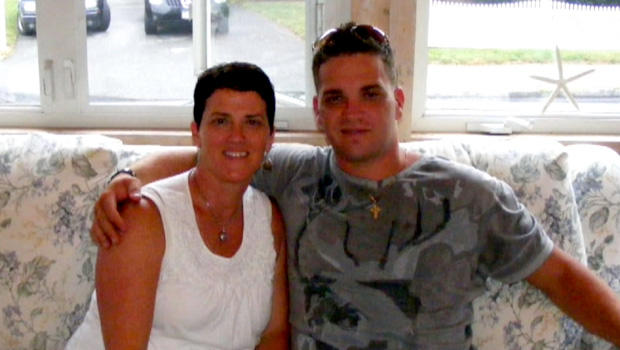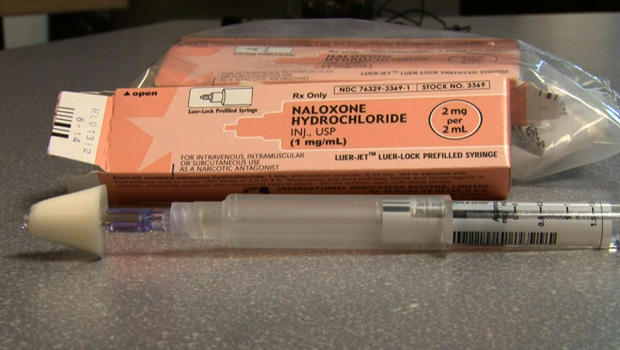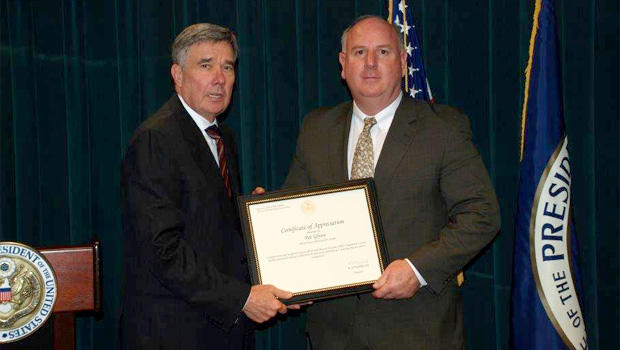Nose spray Narcan reverses overdoses in Mass. town at high rate
(CBS News) QUINCY, Mass. - Nancy Holler's son, Brendan, was an honors student and standout baseball player until his senior year in high school.
"A good kid, never gave us an ounce of trouble," she recalled in an interview.
Then Brendan started sneaking pills of the opioid painkiller Percocet that had been prescribed to his father for a back injury.
Brendan got hooked, and that caused him to drop out of college after six weeks and return home to Quincy, Mass., a city of 93,000 residents 10 miles south of Boston.
"Money started missing, more pills started missing, and that's when he admitted to me -- he said, 'Mom, I've been taking OxyContin,'" Holler said, referring to another widely prescribed painkiller. "That led to heroin, eventually."
After years battling his addiction one night four years ago, Brendan experienced a heroin overdose.
"Brendan was face down on my bathroom floor, and he was blue, and he had fallen between the toilet and the wall, and I couldn't lift him up."
That night paramedics saved Brendan's life with an injection of naloxone hydrochloride, better known as Narcan. The drug reverses overdoses from opioids -- heroin and painkillers derived from opium. It's been available to paramedics and doctors in hospital emergency rooms for three decades, and more recently, in an easier-to-use nasal spray.
When someone is not breathing adequately because of an opioid overdose, there are only minutes to intervene. Narcan reverses an overdose by blocking the narcotic's ability to attach to brain cells. Normal breathing can resume within one to three minutes.
Government pushes painkiller disposal
Clamping down on prescription painkiller abuse
After Brendan's close call, Nancy became an advocate for all first responders in her hometown to carry nasal Narcan. No needles required. The magic marker-sized tube takes just a few seconds to assemble.
Veteran narcotics detective Patrick Glynn oversees the program in Quincy, which is the first police department in the nation to require every officer on patrol to carry nasal Narcan.
"They always have two doses in every cruiser," Glynn said. About 200 officers in Quincy are trained to use the antidote.
"We changed our philosophy," Glynn said. "It's just a simple change where we decided that we cannot arrest our way out of this epidemic."
In Massachusetts alone, more than 500 people die every year from accidental opioid overdoses -- three quarters of them from painkillers, according to the latest Massachusetts Department of Health data, from 2010.
Nationwide, in the past decade, fatal heroin overdoses have nearly doubled to more than 3,000 a year, while fatal painkiller overdoses have quadrupled to 16,000 thousand a year, according to 2010 data from the Centers for Disease Control and Prevention.
More people die in the U.S. from fatal opioid overdoses annually than AIDS or homicide. In 2010, 19,689 Americans died from painkiller and heroin overdoses, while 18,978 died from AIDS, according to the CDC. The FBI tallied 14,722 homicides that year.
While 24 million Americans age 12 and older, or almost 1 in 10, need treatment for illicit drug or alcohol abuse, according to the Substance Abuse and Mental Health Service Administration. Of those, about 7 million Americans abuse prescription drugs, according to the National Institute on Drug Abuse.
Since the pilot program began in late 2010, Quincy police have applied Narcan 179 times and reversed overdoses 170 times, a 95 percent success rate. Five people were already dead when police arrived, while the Narcan had no effect on four people who had consumed other substances. Narcan works only on opioids.
Quincy police officer Ryan Donnelly has reversed eight overdoses before paramedics arrived.
"The cop aspect -- you're like, 'Oh, this person is engaging in an illegal activity, but the human aspect, you're like, 'This is a life,'" Donnelly said.
The life-saving Narcan costs only $22 a dose. The youngest person saved in Quincy was 15, and the oldest was 67.
"They're somebody's daughter or son or father or brother or mother," Donnelly said. "That's what clicks in your head."
When Nancy Holler's son overdosed again at someone apartment last October, a police officer armed with Narcan saved his life.
"People think that this is the homeless junkie that lives on the street, but these are our children. We have a very serious epidemic in this country that started with prescription drugs, and the kids become heroin users," Holler said.
In Quincy now, private citizens can register to carry Narcan, and Nancy Holler has it just in case Brendan, 27, who's been clean eight months, has a relapse.
"I keep one in my cabinet, one in my minivan, and one in my pocketbook," she said. "This is my child. I am going to do everything I can to save his life."
Seeing the results in Quincy, the White House Office of National Drug Control Policy tells CBS NEWS it is working to encourage other police departments to carry Narcan.
With some saved addicts moving to treatment and getting clean, Detective Glynn says the program helps reduce theft by addicts who become burglaries to feed their habits. He also rejects the criticism that the Narcan accommodates drug addicts.
"If we can stop them from being sick and take care of the disease, they won't commit the crime, and they won't be a criminal," Glynn said. "No one is coming to Quincy because we have Narcan, because no one that is under a heroin high wants their high eliminated."
Researcher Abigail Brigham contributed to this report.


